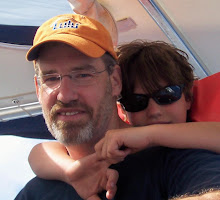When I was a young aspiring baseball player, my Dad would hit me ground balls so that I could learn to field them. Whenever I'd botch one because I was caught on my heels, he would yell, "Play the Ball, don't let the Ball Play You!"
In essence, he meant that when the ball was coming toward me that I should charge forward and meet the challenge rather than simply wait for it to come and potentially overwhelm me. This advice has served me well in many aspects of my life, and it seems good advice for our embattled publishing industry.
Brian made many points during his talk - which I encourage you all to read. One point that resonated with me was when he referred to disparate initiatives in publishing by saying "If we don't hang together, surely we will all hang separately". Don extends this point by talking about there being too many trade organizations and standards bodies - a point I wholeheartedly agree with. (and one that I will address in a future post)
But, in thinking about this a bit more, I can't escape the question: How did we get here, and what ground ball are we trying to field?
The problems we are facing today are but the latest in a constant surge of disruption that has been going on for at least 30 years. Since the early-to-mid 1980's improvements in computer hardware and software have radically changed the throughput of published materials from author to reader.
In the 1980's, computer systems led to supply chain improvements, which (it could be argued) led to the formation of chain stores. The internet and the ubiquity of browser technologies in the 1990's enabled an innovative company named Amazon to be a first mover in disrupting the world of bookstores. Computer to Print, and Print on Demand technologies have radically changed inventory strategies. Constant improvements in computer hardware and telephony have enabled discovering and reading ebooks a reality. The simple process of creating ebooks have encouraged authors, agents, and retailers to become publishers. Now, social networks have once again upset the apple cart and have changed forever how we will choose the books we read. Social networks are also evolving and its certain that collaborative reading and writing will become a normal human endeavor before long.
With each disruption, some of us have "charged the ball", while others "let the ball play us". Groups were formed, sometimes officially, sometimes not, to work together to solve whatever the latest challenge was. Most of these groups were formed because either they didn't acknowledge that other groups existed, or were impatient with the incumbent's speed in addressing the challenge. Many were created for very good reasons, some, well, not so good.
Now we are in a state where we have more trade and standards organizations than you can count, many with the same parties involved. We're all trying to come up with standards and practices that address 80% of the problem. Many of these organizations are vying for financial and human resources from the same constituency. It's not just the disruption that we're all fighting, the problem is that we are fighting ourselves over who owns what solution, and we're all thinking that we're more relevant than the others.
It's ludicrous that to be involved in the technology end of the book industry, you need to be a member of five or six trade organizations.
I say it's time we get all of these groups to huddle together, pool their resources, and get back to work on fielding the grounder that we all face: disruption itself. The disruptions are only accelerating.
It may be a pipe dream, but, "If we don't hang together, surely we will all hang separately!"

